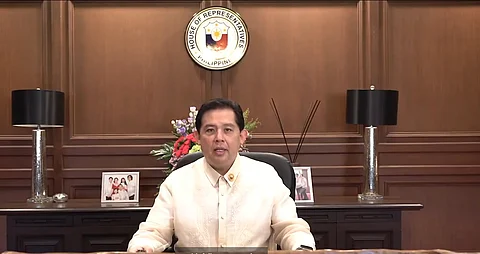
- NEWS
- the EDIT
- COMMENTARY
- BUSINESS
- LIFE
- SHOW
- ACTION
- GLOBAL GOALS
- SNAPS
- DYARYO TIRADA
- MORE

The House of Representatives on Monday registered its dissent on the Supreme Court’s ruling through a petition seeking to reverse its contentious decision that nullified the impeachment case against Vice President Sara Duterte on the grounds of unconstitutionality.
In a 70-page motion for reconsideration filed by the Office of the Solicitor General, standing as counsel of the House, the chamber asked the SC to overturn its unanimous decision dated 25 July, and immediately suspend the executory nature of the same.
The House upheld its position that the one-year bar was not violated because it was the filing of the fourth impeachment complaint, constituting the articles of impeachment, that caused the one-year prohibition to take effect.
This contravenes the high court’s verdict that the articles were barred because the House’s putting the first three complaints in the archive rendered it “effectively terminated and dismissed,” which triggered the one-year bar.
However, citing Francisco v. House of Representatives — a doctrine held by the SC itself — the House argued that initiation only takes place after the referral of the impeachment complaint to the House Committee on Justice or by the filing with the secretary general by at least one-third members of the entire House.
“Considering that the first three complaints had yet to be referred to the Committee on Justice, the members of the House were free to file a verified complaint via the second mode, as no impeachment proceeding [had] been initiated at that time,” the motion read.
Further, the chamber also refuted the SC’s conclusion that it trampled upon Duterte’s right to due process when it expedited the proceeding when it transmitted the articles directly to the Senate.
Beating or surpassing the one-third threshold is a shortcut route allowed by the Constitution in order to fast-track the proceeding. This means that the committee will no longer hold a hearing, and the articles will be transmitted directly to the Senate for trial without requiring any answer or appearance from the impeached official.
The House asserts that SC formed a new set of standards, claiming there is nowhere in the Constitution that requires an impeached official to be heard before the articles are transmitted.
The chamber contended that the court did not squarely apply the constitutional procedures in the case of Duterte.
“The Honorable Court cannot utilize these newly formulated rules, safeguards, or guidelines to say that the House violated the due process clause and acted with grave abuse of discretion just because it did not comply with the new prescriptions as set forth in the Decision. It would simply be unfair,” the House pointed out.
The motion further states that the SC must allow Congress to perform its constitutional duty concerning impeachment proceedings—to initiate an impeachment case for the House, and to try the same, for the Senate.
“The House is not asking of this Honorable Court to favor any one political result…The House asks this Honorable Court not to stand with a certain political faction or another, but to uphold the Constitution,” the motion read.
Meanwhile, Speaker Martin Romualdez reminds the SC that the power to initiate impeachment rests solely in the House of Representatives, “not shared, not subject to pre-approval, and not conditional.”
He warned that the SC’s inventing new rules not in line with the Constitution and applying them retroactively “is not just unfair, but constitutionally suspect.”
The House chief emphasized no branch of government should dictate the boundaries of its own accountability, and that members of the SC are also impeachable officials.
“The Supreme Court is a co-equal branch of government. Its wisdom is deep. Its authority is real. But its Members—like the President and the Vice President—are also impeachable officers,” he pointed out.
Romualdez added, “When the Court lays down rules for how it, or others like it, may be impeached, it puts itself in the dangerous position of writing conditions that may shield itself from future accountability.
“Because if impeachments can be blocked by misunderstood facts, or rules made after the fact, then accountability is not upheld: it is denied,” he continued.
Nonetheless, Romualdez said that the filing of the motion is not to provoke or to assert supremacy, but to restore balance.
Members of the Senate minority bloc have also revealed plans to file a resolution to carry on with Duterte's trial, citing the separation of powers of the legislative branch from the judiciary.
Duterte was the first second-highest official impeached by the House on 5 February on grounds of graft and corruption, bribery, betrayal of public trust, culpable violation of the Constitution, and other high crimes.
